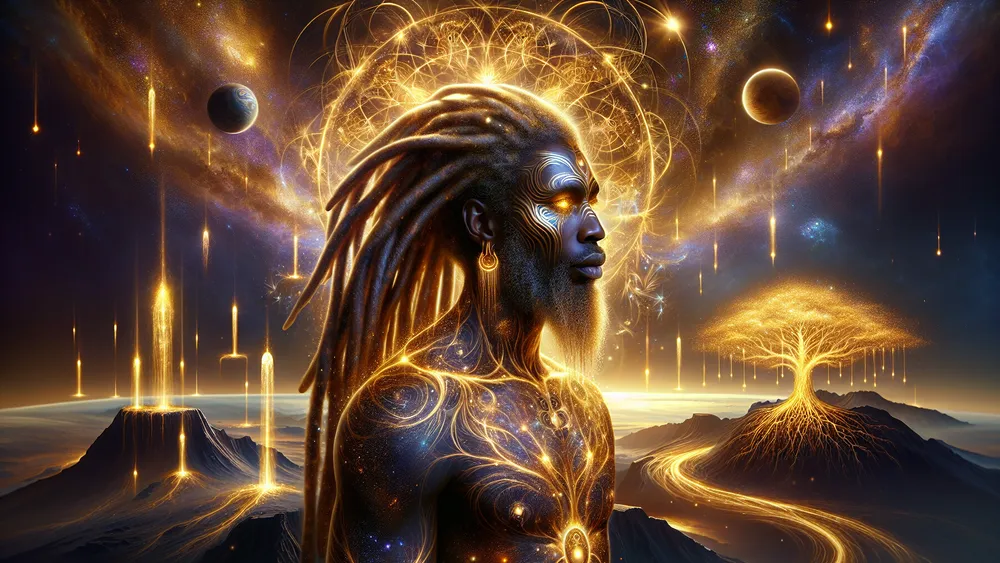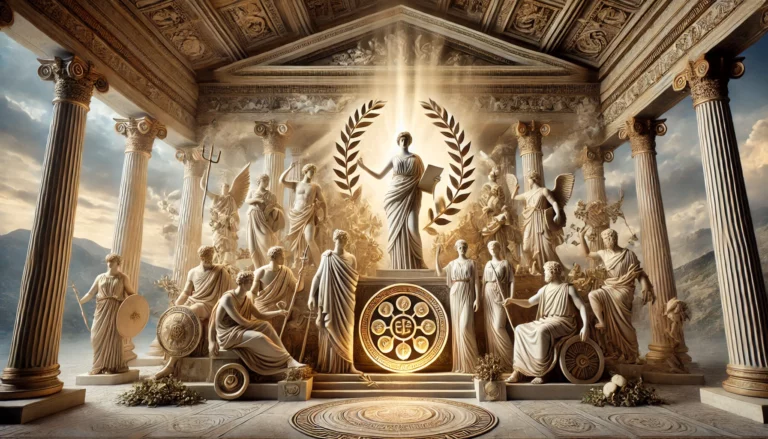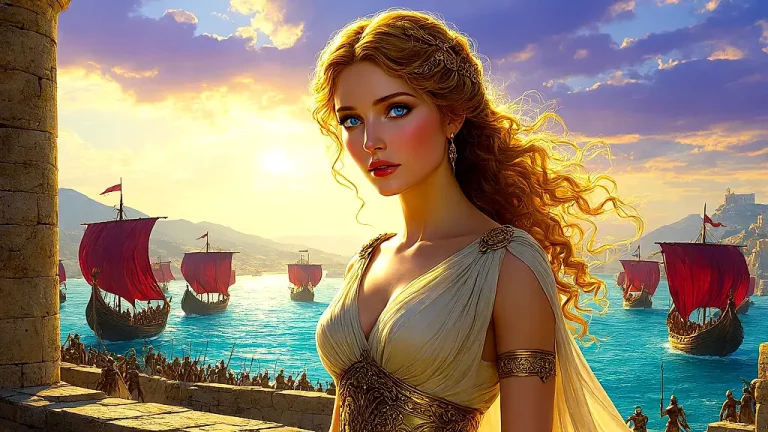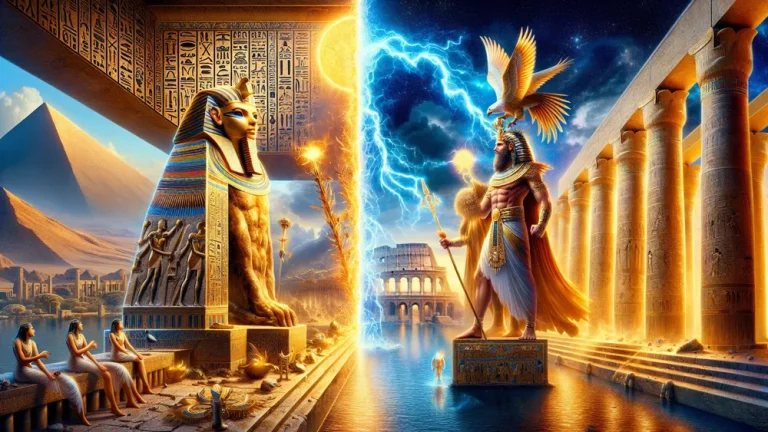Katonda: The Creator God Worshiped By The Buganda People
For a long time, societies everywhere have tried to understand life itself, what controls everything around them, and how powerful beings affect their future. The Buganda people, who live in what is now called Uganda, believe that Katonda holds this responsibility. He is seen as the one who brought everything into existence.
Key Points:
- Katonda is the Buganda people’s creator god, responsible for making everything.
- He does not take part in daily events but works through spirits and lesser gods.
- Unlike Zeus or Odin, he does not fight battles or rule people directly.
- His home is beyond the world, not a place humans can visit.
- People honor him through rituals but usually connect with him through other spirits.
- Justice and balance happen naturally based on actions, not through direct punishment.
- His role is similar to other African creator gods, but Buganda beliefs have their own unique details.
More than that, he is also an all-powerful force that shapes both the world we can touch and the one we cannot. Some might compare him to gods such as Ra in Egyptian tradition or Odin in Norse stories. But while these deities have great importance, Katonda is different. He does not battle his enemies like a Norse god. He does not rule over others the way Zeus does, always stepping into human lives.
Instead, he is beyond all of that – existing everywhere at once yet letting other spirits handle what happens on Earth. This way of seeing a supreme god fits with beliefs in many African cultures. Often, the greatest divine being is not one who takes action constantly, but rather one who remains above everything else, watching, always present but distant.
Katonda’s role in Buganda beliefs is unique, and by looking closer, we can better understand his meaning, the stories about him, and his impact.
Katonda: Overview and Key Facts
| Key Aspect | Details |
|---|---|
| Name Meaning | The name Katonda comes from the Luganda word okutonda, which means “to create.” This directly explains why he is seen as the Supreme Creator in Buganda beliefs. |
| Role in Mythology | People believe Katonda made everything – the land, the sky, and all living things. He is thought to be the one who keeps things running and holds the most power over existence. |
| Position in Buganda Belief System | In Buganda belief, Katonda is the highest of all spiritual forces. However, he is often seen as a god who stays distant, leaving messengers, spirits, and smaller gods to handle things on Earth. |
| Comparisons to Other Deities | Ra, the Egyptian sun god, is similar in power, but unlike Ra, Katonda remains apart from human affairs. He is more like Nyame, the Akan creator god, who also lets others handle human matters. Zeus, the Greek king of gods, is different because he acts in a more direct, human-like way. |
| Primary Domain | His role includes creating, bringing life, and keeping balance in the universe. He does not control war, water, or specific natural things like other gods in myths do. |
| Worship and Respect | People pray, bring offerings, and hold rituals to honor him, though they usually do this through spiritual messengers or special places rather than worshiping him directly. |
| Residence | It is believed that Katonda lives beyond the physical world, in a place that can be compared to Norse Asgard or Greek Mount Olympus, but unlike those, it is not filled with other gods. |
| Divine Helpers | Instead of managing everything himself, Katonda works through spirits, ancestors, and lesser gods. This is similar to how Odin has Valkyries or how Nyame gives tasks to lower deities in Akan tradition. |
| Influence on Morality and Order | People see him as the source of fairness and balance. He rewards good actions and makes sure everything in both the world of people and the world beyond follows the right order. |
| Modern Relevance | Although formal worship of Katonda is not as common today, ideas about him still appear in some traditions and cultural practices in Uganda, especially in spiritual life. |
Who is Katonda? Learning About the Buganda People’s Supreme Creator
To understand Katonda’s role in Buganda beliefs, it helps to look at his name, what it means, and the stories people tell about him. Many describe him as the most important god, the one who made the earth, the sky, and everything that exists. People speak about his act of creating everything, and they also explain how he is viewed and respected.
Looking deeper, it is important to see how people describe him and what their traditions say about him. Instead of being involved in everything, as some gods are, people believe that Katonda remains far above, letting other spirits take care of things in the world.
What Does Katonda Mean? His Role in Buganda Mythology
The name Katonda comes from the Luganda verb okutonda, a word that means “to create” or “to bring things into existence.” Because this word means creation, it helps explain why people think of him as the most important god in Buganda beliefs. Other gods are responsible for particular things, like fertility, the sky, or war. But Katonda’s power is about creating everything and keeping life going.
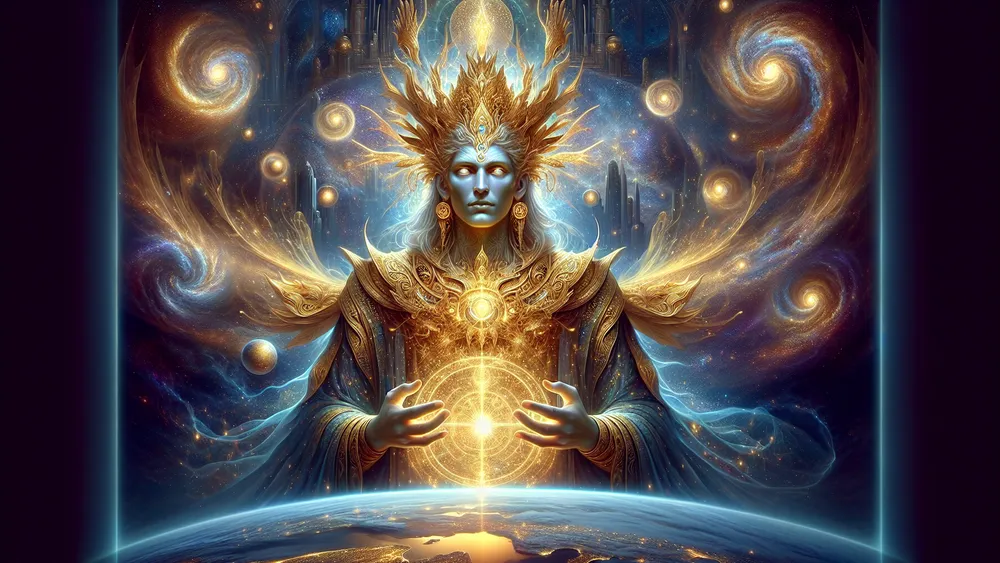
His great power is not just something people understand from his name. They also believe it because he is beyond everything, not limited like human beings. The idea of a god like this is seen in many cultures.
In ancient Egypt, the sun god Ra was called the “giver of life.” The Akan people of West Africa believed the god Nyame was the one behind everything that exists. Some gods, like Zeus from Greek myths, take an active role in what happens in the world. Katonda is different because he does not, and people describe him as a force beyond everything.
Since he does not take part in daily life, he has spiritual messengers and other supernatural beings who take care of the world instead. This belief is part of how Buganda spirituality works – people believe in ancestors and spirits, but they always know that Katonda is the highest one above all.
Katonda is the most powerful god in Buganda beliefs because he created everything and keeps life going, but he does not take part in daily events, leaving that to spirits and messengers.
The Creation Story: How Katonda Brought Everything to Life
In Buganda traditions, Katonda made everything – the earth, the sky, and all living things. People believe he first created the heavens, where he stayed, far away from mortals. From there, he shaped the world below, making the land, the waters, and all the mountains carefully.
Unlike gods from other myths, who created life by fighting or controlling chaos, Katonda created everything in a calm and planned way. The first humans, according to tradition, were also made by him. He gave them the ability to grow in number and survive, making sure that life continued without stopping.
He also set rules for the natural world, deciding how time and seasons work, as well as how living things are born and die. But instead of controlling everything in detail, he let messengers and spiritual beings handle daily life. The way Katonda created the world is very different from how other myths describe creation.
In Egyptian stories, the universe comes from Nun, a great mass of water, and gods like Ra or Atum bring life out of chaos. Norse mythology tells of a violent beginning, where Odin and his brothers kill Ymir, the first giant, and use his body to form the world. In Greek tradition, gods fight for power until Zeus takes control.
But unlike so many other myths, Buganda’s creation story has no great battle, no dead ancestor, and no war to gain power. It is not a story of struggle. Instead, Katonda creates the world on purpose and makes sure it runs correctly. He does not take part in human affairs like Odin or Zeus.
Instead of acting directly, he remains beyond the world and leaves everything under the care of spiritual messengers.
Key Differences Between Katonda’s Creation Myth and Others:
- Where life comes from – Many myths say the world was made from water or chaos. Katonda creates everything by deciding it should exist.
- How the world was made – Gods in many stories use war or fighting to create things. Katonda does not struggle, and he faces no enemies.
- How involved the god is – Some gods, like Ra, Odin, or Zeus, rule the world closely. Katonda does not interfere and lets others manage life.
- What the god looks like – Zeus is often described as a figure who acts like a human and appears in human form. Katonda does not take a physical shape.
These details explain why Buganda beliefs describe creation as an organized and peaceful thing, not the result of conflict. Katonda starts everything, sets the rules, and leaves it to continue without his direct actions.
Where Does Katonda Live? The Home of the Supreme Creator
In Buganda traditions, Katonda lives far beyond everything. People believe he exists in a place where no human can go, completely apart from the physical world. Unlike many gods from myths who live in mountains, Katonda is not in a visible place with landscapes, cities, or anything physical. Other traditions have gods that are very close to humans.
The Greeks describe Mount Olympus, where Zeus and other gods live in a great place, acting like humans. In Norse mythology, Asgard is a special city that exists in a different way, connected to the earth by a magical bridge so gods like Odin and Thor can still visit people. Katonda’s home is not like this.
There are no roads, bridges, or doors leading to Katonda’s home, and it is not a city or a kingdom. People say Katonda’s home is not a palace or a castle, but a place outside the world where nothing physical exists. He does not have a throne, a temple in the sky, or any kind of form people can imagine.
This makes people believe that he controls everything without ever being close to the world. In many Western myths, gods have human-like personalities and actions. Katonda does not. He does not live in a place filled with other spiritual beings. He does not walk on earth, talk to humans, or take part in their problems.
His home has nothing like the homes of other gods, which are filled with things that look familiar to people. Instead, he exists completely apart from the world, beyond time, space, and anything human.
The Powers and Influence of Katonda
Katonda’s power is not just about making things. He also controls life, keeps order, and decides what happens to people’s lives. People say he made everything, but his work did not stop there because he also decides how life works, how things stay in order, and what happens to people in their lives.
Not only did Katonda create everything, but his power also reaches into every part of life. His decisions affect what people believe about the spirit world and the way they understand the forces that control existence.
The Almighty Creator: What Makes Katonda Unique?
Katonda’s greatest power is making everything because people say he created the universe by himself. Unlike gods that focus on one part of the world, like Ra, who controls the sun, or Zeus, who rules over thunder, but Katonda is different because he is in charge of everything that was created. He made the earth, the sky, and every living thing.
But his power is not just about creating things – he also makes sure that life continues, that people are born, and that the land remains fertile. His power reaches human life and how the land produces food, which means he is not only responsible for creating things but also for making sure life continues.
Katonda does not face rivals, challenges, or wars with other gods. While some gods compete for power or overthrow others, Katonda has power over everything that exists, and no other gods fight with him or try to take his place. His position is absolute.
To see the differences between Katonda and similar gods, here is a table comparing their powers:
| Deity | What They Control | Role in Creation | How Powerful They Are | Connection to Humans |
|---|---|---|---|---|
| Katonda (Buganda) | Creates everything, including life | Made the universe alone | No other gods challenge him | Does not often interfere |
| Ra (Egyptian) | Sun, order of the world | Creation linked to the sun’s movements | Powerful but with other gods | People worship him through rituals |
| Zeus (Greek) | Thunder, ruling over gods | Did not make the world, won leadership by force | Strong but has other powerful gods around him | Often changes events on Earth |
| Odin (Norse) | Wisdom, war, and knowledge | Helped form the world from a giant’s body | Important but part of a system of gods | Guides and speaks to humans |
Looking at all these gods together, it is clear that Katonda’s power includes everything, not just one thing. While Zeus and Odin rule alongside other gods, Katonda does not share his control with anyone. He is unique because he does not interfere with human lives as much as Ra, who is actively worshiped in rituals connected to the sun. His power is greater than all of them because he is a complete and unchallenged creator.
How the Buganda People Honored Katonda in Daily Life
Through prayers, gifts, and special ceremonies, people showed their respect for Katonda. But ordinary people did not pray to Katonda directly, which made him different from gods like Zeus or Odin. Instead, they reached him through other spirits (mizimu) and gods (balubale), who acted as go-betweens.
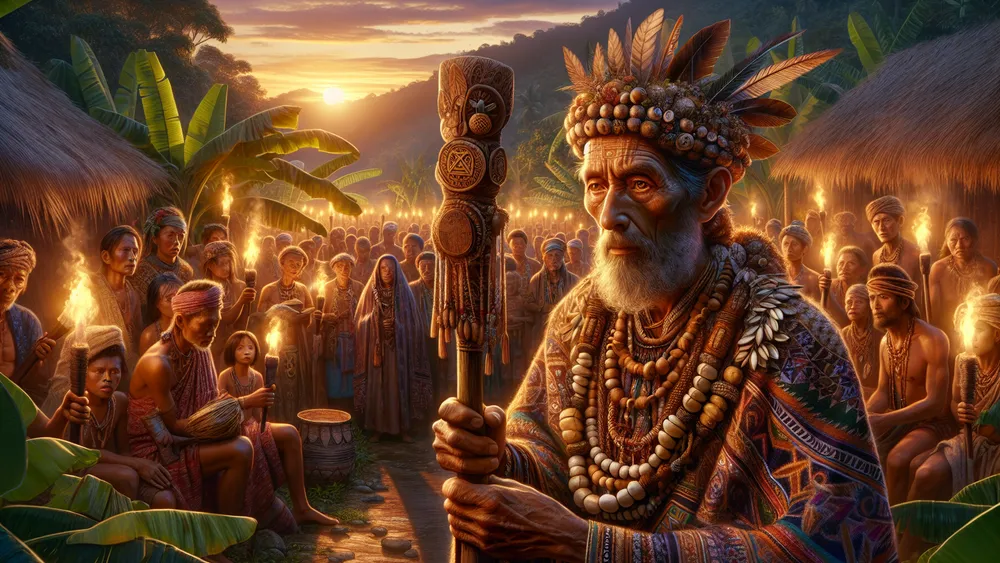
People brought food, animals, and other gifts to shrines to ask for help with health, protection, and making sure families and crops continued to grow. It was spiritual leaders or priests who led the rituals, making sure the ceremonies were done for the entire community and not just one person.
Unlike in Greece, where Zeus had big temples, festivals, and statues, worship was more personal and different from one place to another. It happened in homes, during seasonal gatherings, and in private places where people believed they could connect with spirits.
The Norse honored Odin with warrior rituals, sacrifices, and ceremonies connected to battle and wisdom, but honoring Katonda was not about war – it was about keeping life in balance and giving thanks.
People did not pray to Katonda directly but instead reached him through spirits and gods, offering gifts and holding ceremonies to ask for help with health, protection, and family well-being.
Divine Helpers: Mythical Beings Who Work Under Katonda
Katonda did not speak to people directly. Instead, different spirits and gods acted as middlemen between him and those who needed blessings, protection, or guidance, making sure that people could still ask for help even if Katonda himself stayed distant from human life. Among these were the balubale and the mizimu, both playing an essential role in how people connected with the gods.
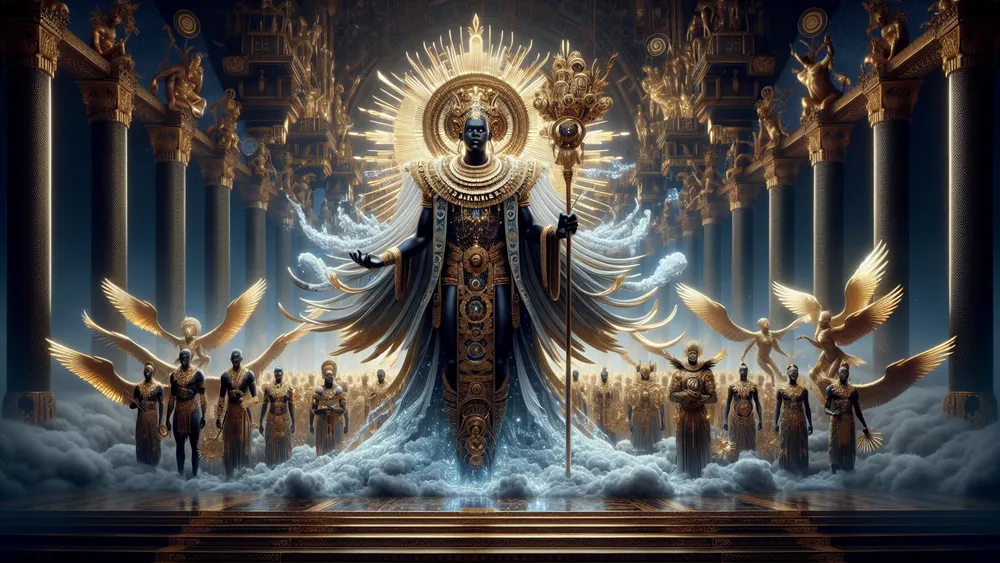
Some balubale were closely linked to certain parts of daily life and had roles that affected people in different ways. Some were tied to fertility, war, or health, and they either brought good or bad outcomes depending on what the gods wanted. Two important ones were Mukasa, the god who helped people prosper and have children, and Kibuuka, who was in charge of war and protection.
The mizimu, who were seen as the spirits of people who had died, acted as messengers between the living and Katonda, speaking to him and asking for his help. Because Katonda was far away from daily life, these spirits helped people reach him.
Greek and Norse mythology also have something like this. The Greeks had Hermes, who carried messages for Zeus, and in a similar way, the balubale helped carry out Katonda’s will. Another example is the Valkyries in Norse stories, who decided which warriors were worthy enough to reach Odin’s hall when they died.
But while Greek and Norse messenger figures were more like separate characters with their own personalities, the balubale were seen as powerful forces that were connected to nature and people’s lives. Because of that, the Buganda system made spirits and gods something that was part of everyday traditions, rather than just stories about gods with human-like traits.
The Cosmic Order: How Katonda Keeps the World in Balance
Katonda does more than just create things. He also protects balance, making sure that life, right and wrong, and the future stay the way they are supposed to. Keeping things in balance is one of the most important roles of Katonda.
Not only does Katonda create, but he also makes sure everything stays in order. This means he keeps things fair, watches over what happens after death, and makes sure nothing goes out of order. We can see how he does this by looking at how he controls justice, takes care of the world after people die, and makes sure that balance is never broken.
Justice and Punishment: How Katonda Rewards and Disciplines People
Katonda is the highest judge of right and wrong. He makes sure fairness happens, both in this world and beyond. His power decides whether people are rewarded for good choices or face bad outcomes for the wrong ones. He does not interfere, but fairness happens because of people’s own actions.
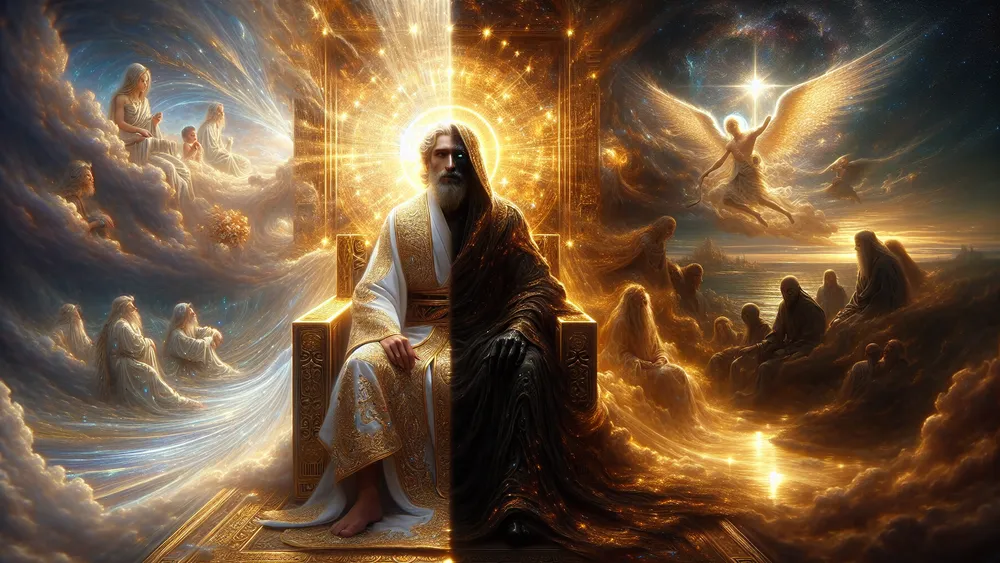
Someone who follows traditions, respects others, and does what is right may receive good health, children, and a successful life. But if someone is dishonest, only cares about themselves, or refuses to follow the way things should be, bad things like illness, struggles, or bad luck can happen to them as a result. Unlike gods who fight battles or punish wrongdoers directly, what happens in someone’s life – the good and the bad – takes place naturally, based on what they do.
Other beings also make sure justice happens. Ancestral spirits (mizimu) and lesser gods (balubale) sometimes punish those who break important rules, making sure that even kings and powerful people do not escape the consequences of their actions. Horus in Egypt and Thor in Norse stories also had roles in justice, though they acted in very different ways.
Horus made sure that kings ruled correctly, similar to how Katonda’s rules kept Buganda’s leaders in line. In Egyptian belief, Horus followed Ma’at, the rule that kept balance and truth in the world. Thor, on the other hand, handled justice with strength. He used his weapon, Mjolnir, to fight enemies and remove dangers.
Thor fought on battlefields to protect Asgard, but Katonda does not take part in any kind of fighting or war. He has complete power, but he does not directly interfere. Instead, he keeps everything balanced, controlling what happens to people and entire groups. His fairness means that those who do right find success, while those who do wrong suffer because of their own choices.
What Happens After Death? The Buganda View of the Afterlife
When people die, they do not just disappear. They move into the world of spirits, where they may still have an effect on the living.
Spirits of people who lived well stay with their family and can even be honored. If someone followed the customs of their ancestors, respected traditions, and behaved in the right way, they could become respected spirits, watching over their descendants and sometimes receiving honor from them. These spirits can give guidance, protection, and blessings.
But those who broke important rules or disrespected traditions? They might not find peace and instead, their spirits could wander without a place to stay. The spirits of ancestors work as go-betweens for the living and Katonda, making sure that morals still matter even after death. People who lose their family’s respect and are forgotten face serious consequences, but there is no idea of a never-ending punishment like Hell in some religions.
This belief is somewhat like ideas in Greek and Norse mythology, but it is also different in important ways.
The Greeks believed that some chosen people could enter Elysium, much like how honorable ancestors stay with their family’s spirits. The Greeks also had Tartarus, a place for extreme punishment, but Buganda beliefs do not have an exact version of this. Instead, they focus on whether or not someone is remembered or forgotten.
Vikings believed that warriors who fought bravely could enter Valhalla, and those who did not die as warriors went to Helheim, a different place for the dead.
Unlike Buganda beliefs, Greek and Norse stories focus more on warriors or punishment. In Buganda traditions, what happens after death depends less on battles and more on following traditions and keeping a strong connection to one’s ancestors.
How Katonda Connects to Other African Creator Gods
Katonda is the highest god in Buganda beliefs. But other African peoples also believe in gods who made everything and control life. Some of these gods have stories that seem alike, while others are very different.
Across Africa, different peoples tell stories of gods who made the world and everything in it. Some created people, others gave laws, and a few have roles that might remind people of Katonda’s position in Buganda beliefs.
We can look at how Katonda is alike or different from these other gods, and we can also see if their stories seem to match in any way.
Is Katonda the Same as Nyame or Amma? Comparing Supreme Beings
Many peoples in Africa believe in a highest god, and some of them have things in common with Katonda. In the beliefs of the Akan people in Ghana, Nyame is highly respected as the god of the sky. People believe that Nyame does not deal with small, daily things. Instead, other gods handle them for him.
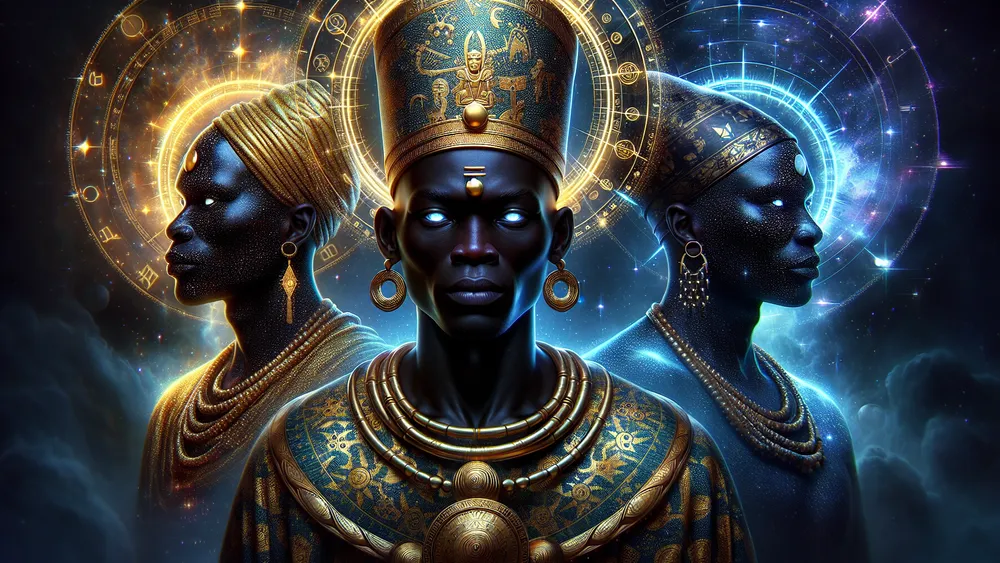
This is like how Katonda in Buganda beliefs has spirits, called the balubale, who do certain tasks. But one difference is that Nyame is thought of as staying far away and not being part of people’s lives, while Baganda believe that Katonda is still close to them in a spiritual way.
The Dogon people from Mali worship Amma, a god who created the world and gave order to everything. Amma is somewhat like Katonda because they are both all-powerful gods who make sure the world stays balanced. But Amma’s story also talks a lot about mystical twin spirits called the Nommo, who play a vital role, while in Baganda beliefs, the focus is more on Katonda as the one in control of everything.
Even though some of these African gods seem alike in a few ways, their stories are often very different.
In Akan traditions, Nyame is said to have made everything and then moved far away, letting other gods take care of the world. But in Buganda stories, Katonda never leaves or steps back. The Dogon story of creation also includes a cosmic egg that formed the world, while in Buganda beliefs, everything was created directly by Katonda’s command.
Some African gods are similar to Katonda, but each has its own story about creating the world. Amma’s myths include special knowledge about the stars and spiritual beings with deep cosmic meaning. But in Buganda traditions, Katonda’s main role is to be the ruler of life, morality, and everything that exists.
The Many Supreme Gods of Africa
Across Africa, different peoples believe in many high gods, and each plays a role in their stories about creation. Some of the most well-known of these gods include Nyame of the Akan, Olodumare of the Yoruba, and Khalanga of the Shona. They represent how the world was made, have power over right and wrong, and control everything that exists. These gods are different in how they act.
Some, like Katonda, still take part in things that happen to people. Others, like Nyame, are thought to have moved away after making the world. Instead of staying involved, they let other gods take care of things after that. If you want to read about more African creator gods and their stories, look at this full list: Full list of African Gods.
FAQs
1. Is Katonda the same as the Christian God?
Katonda and the Christian God share similarities as supreme creators, but Katonda originates from Buganda mythology and is distinct from the monotheistic deity of Christianity.
2. Are there still people who worship Katonda today?
There are still people who worship Katonda today, mainly within traditional Buganda spiritual practices, although many have integrated his reverence with Christian beliefs.
3. How does Katonda compare to Zeus and Odin?
How Katonda compares to Zeus and Odin lies in his role as a supreme creator, as opposed to Zeus, who rules the Greek gods, and Odin, who governs wisdom and war in Norse mythology.
4. Does Katonda have a rival or enemy deity?
Katonda does not have a direct rival or enemy deity in Buganda mythology, as he is considered the supreme and uncontested creator.

